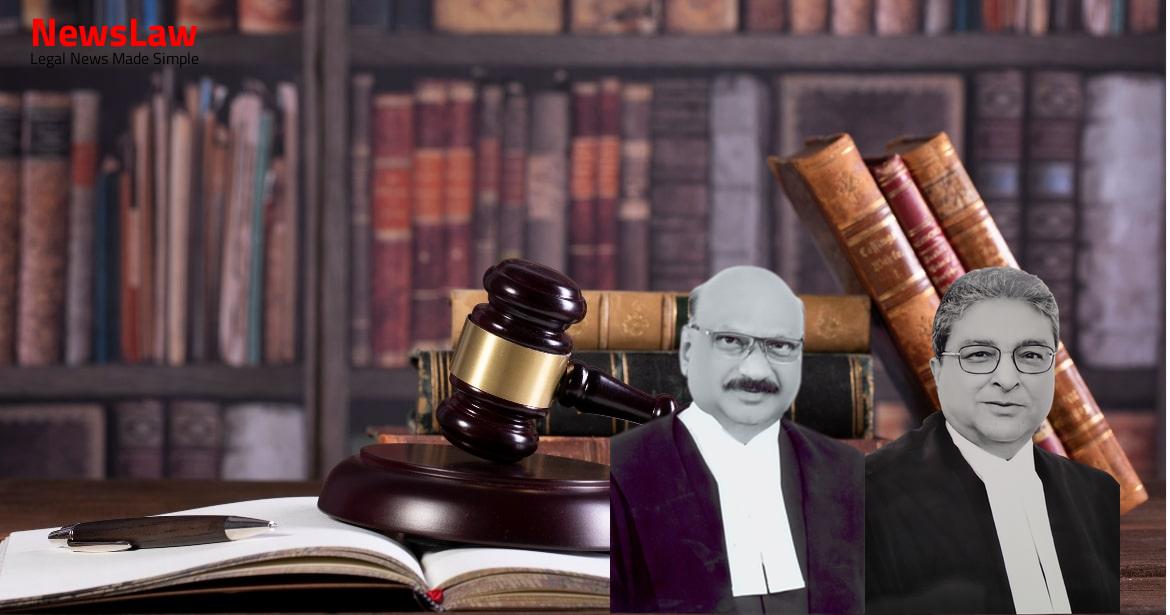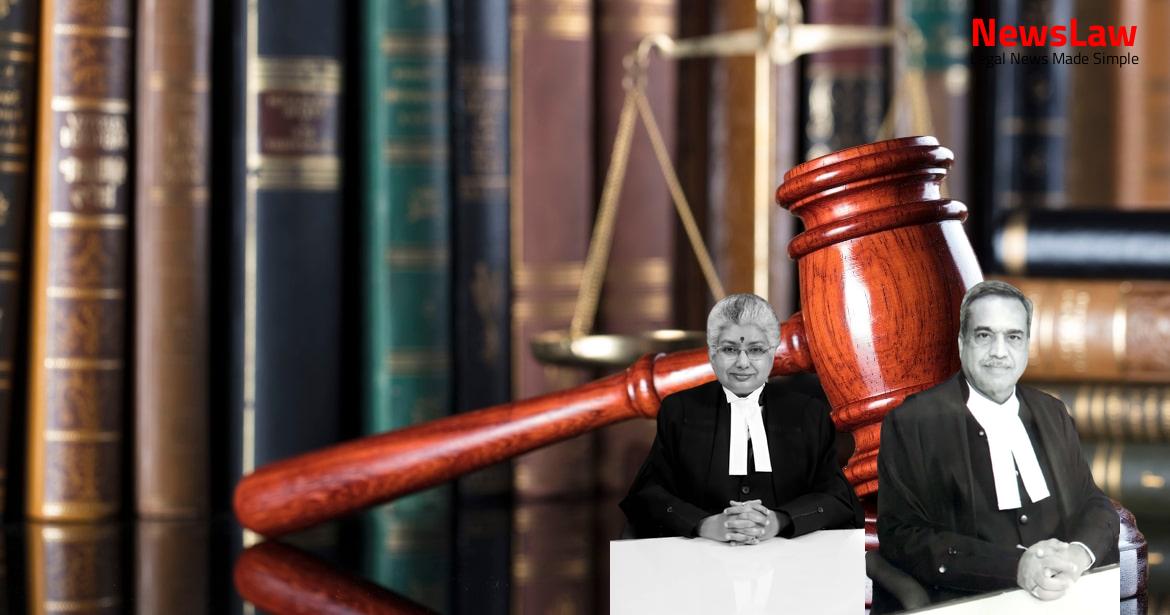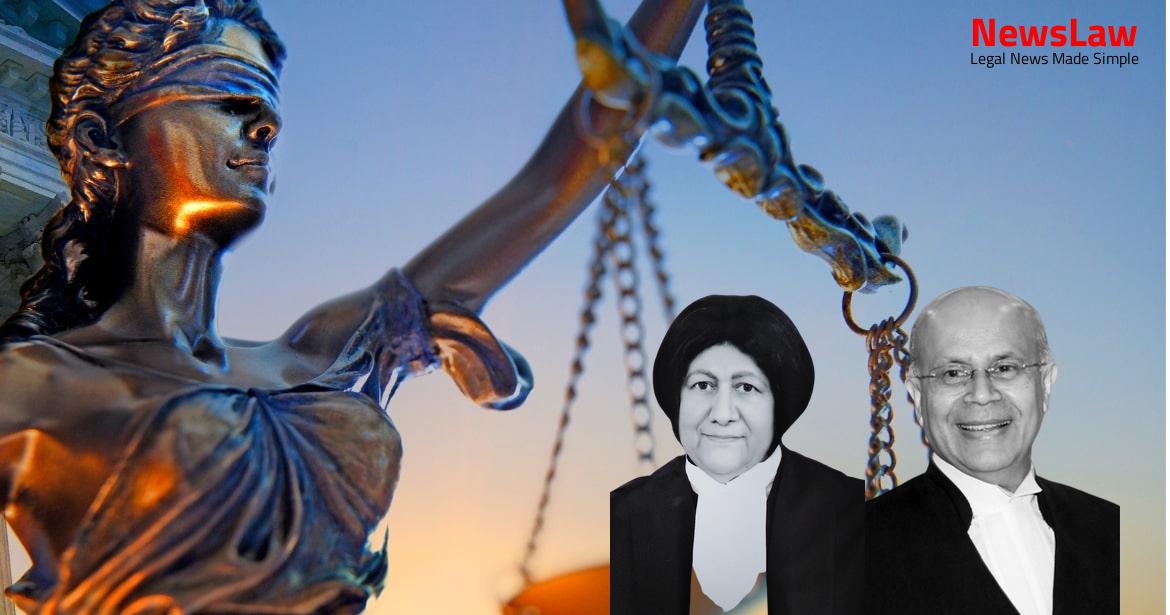Delve into the detailed legal analysis of High Courts’ jurisdiction and court orders under Article 142. The complexity of judicial superintendence, powers of granting interim relief, and the careful balance between expeditious disposal of cases and upholding substantive rights are crucial aspects to be considered. This summary focuses on the nuances of legal interpretation and application by the courts to ensure justice is served while maintaining the integrity of the legal system.
Facts
- High Court has jurisdiction to consider a challenge to an order of framing charge under the PC Act
- Order of framing charge under the PC Act was held to be interlocutory
- A view was expressed for reconsideration of a decision in the case of Asian Resurfacing of Road Agency Private Limited & Anr. v. Central Bureau of Investigation by a larger Bench
- In the case of Asian Resurfacing, a Bench of three Hon’ble Judges held that the order of framing charge was not interlocutory or final
- High Court has the jurisdiction to grant a stay of the trial proceedings
- A case was referred to a larger Bench to consider the correctness of the decision in Mohan Lal Magan Lal Thacker v. State of Gujarat regarding interference by the High Court with an order of framing charge under the PC Act
Also Read: Electoral Malpractices in Mayor Election
Issue
- The issue at hand questions whether the Supreme Court can automatically vacate all interim orders of stay issued by High Courts on civil and criminal cases after a certain period under Article 142 of the Constitution of India.
- Another aspect to be determined is whether the Supreme Court has the authority under Article 142 to instruct High Courts to conclude pending cases where interim stay orders are in place.
Also Read: Balancing Power and Transparency: Electoral Bonds Struck Down, Disclosure Mandated
Arguments
- The object of stay orders has not been considered in Asian Resurfacing case.
- A successful litigant should not be prejudiced if the main case is not heard within six months due to reasons beyond their control.
- The Court should not decide important questions without a proper lis, as per Sanjeev Coke Manufacturing Company case.
- Provisions regarding automatic vacation of stay orders on appeal not being disposed of within 365 days were held arbitrary in Deputy Commissioner of Income Tax v. Pepsi Foods Limited case.
- Automatic vacation of interim relief is deemed unjust, unfair, and unreasonable.
- Laws of procedure are grounded in principles of natural justice, as per Raza Buland Sugar Co. Ltd. v. Municipal Board, Rampur case.
- Provisions of law imposing conditions within a timeframe should be considered directory if non-compliance consequences affect someone not in control of the situation.
- Interim relief is granted after considering prima facie case, balance of convenience, and irreparable injury to the aggrieved party.
- Recourse to the order of grant of interim relief is taken when the hearing on merits is expected to take time.
- An advocate representing the intervenor Abhinav Bharat Congress, Prof (Dr) Pankaj K Phadnis, filed written submissions.
- He argued that an order can only be vacated by a judicial act.
- He asserted that the interim order of stay should be considered a judicial act.
- Prof (Dr) Pankaj K Phadnis claimed that he was not allowed to participate in the hearing via video conferencing.
Also Read: Recall of Resolution Plan Approval: Legal Analysis
Analysis
- The High Courts deal with a variety of cases involving criminal appeals, bail petitions, writ petitions, and matters related to liberty under Article 21 of the Constitution.
- The High Courts have a heavy workload due to the large number of appeals and petitions filed before them.
- Setting time-bound schedules for disposal of cases by constitutional Courts is not advisable, as each case must be decided based on its own circumstances.
- The powers under Article 142 of the Constitution are meant to ensure complete justice between the parties involved in a case.
- Judicial superintendence over legislative action under Article 226 and Article 32 is an integral part of the Constitution.
- Blanket directions automatically vacating stays granted by all High Courts cannot be issued under Article 142.
- The power to grant interim relief should be exercised responsibly, considering factors like prima facie case, irreparable loss, and balance of convenience.
- Ad-interim orders of stay should have a limited duration and not be automatically vacated solely due to the passage of time.
- The principles of natural justice mandate that all affected parties be heard before vacating or modifying an interim order.
- The jurisdiction under Article 142 must be used judiciously to balance the rights of litigants and ensure expeditious disposal of cases.
- High Courts have the power of superintendence over all courts and tribunals within their jurisdiction.
- Article 142 can be used to achieve complete justice in a case but cannot nullify benefits derived from valid judicial orders by other litigants who are not parties to the case.
- Article 142 does not empower the Court to ignore substantive rights of litigants.
- While Article 142 allows procedural directions for expeditious case disposal, it should not affect substantive rights of non-parties.
- High Courts have discretion which cannot be taken away by the Supreme Court’s use of Article 142.
- Judicial pronouncements are not flawless legal concepts.
- Delay in trials affects faith in Rule of Law and the legal system’s effectiveness.
- The power to grant stay is coupled with accountability and has been recognized in various court cases.
- The Supreme Court’s powers under Article 142 can’t be controlled by statutory provisions but should not conflict with laws dealing expressly with a subject.
- The Court should not deal with issues that do not arise for consideration and should not ignore substantive statutory provisions while using Article 142.
- The power of Courts to interpret, declare laws, remove lacunae, and fill gaps is essential to prevent injustice and complete justice between parties.
- The High Courts have the power to vacate or modify an order of interim relief under certain circumstances.
- The High Courts can do so if a litigant prolongs proceedings to take undue advantage of the order of stay, either by seeking unwarranted adjournments or remaining absent during the main case hearing.
- An interim order may be vacated if it is found to have been granted due to suppression or misrepresentation of material facts.
- The High Court can also interfere with an interim order if there is a material change in circumstances.
- Constitutional Courts should issue directions for time-bound disposal of cases only in exceptional circumstances.
- The decision of prioritising case disposal should be left to the concerned Courts where the cases are pending.
- The right to be heard before an adverse order is passed is a substantive right, not just a matter of procedure.
- The power of the Court under Article 142 cannot be used to violate principles of natural justice.
Decision
- Automatic vacation of stay cannot be granted by the High Court.
- Pending petitions are to be placed before appropriate Benches for expeditious disposal.
- High Courts should consider guidelines in paragraphs 34 and 35 when granting interim relief.
- Orders of automatic vacation of stay remain valid in cases where trials have been concluded solely based on Asian Resurfacing case.
Case Title: HIGH COURT BAR ASSOCIATION ALLAHABAD Vs. THE STATE OF UTTAR PRADESH (2024 INSC 150)
Case Number: Crl.A. No.-003589 / 2023



